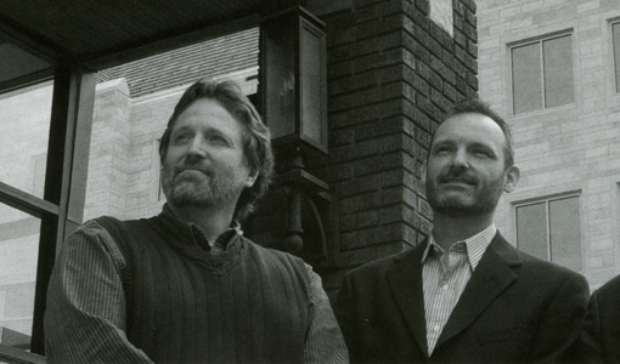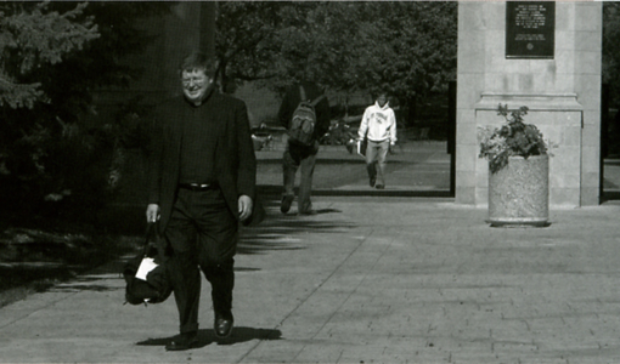"I thoroughly enjoyed my experience here. One of our immigration clients was just granted asylum last week after a four-year process. We became well acquainted with some of the hardships this person had been through and continues to face. It was a moving and rewarding experience for all of us. The teams that I have worked with have been very sensitive to their clients' needs and situations, such as cultural awareness and values, and clients have benefited from these positive relationships. The team members have also been praised by the judges and other legal professionals for their level of expertise, so our clients are receiving excellent service."
- Lydia Radke, master of social work student, on the 400 hours she spent in the Interprofessional Center in 2003-2004
They come to the center – the underserved poor – for help with problems ranging from health care issues to political asylum to life-threatening situations of domestic violence.
And St. Thomas students enrolled in the schools of law, social work and professional psychology work with these clients under close faculty supervision at the Interprofessional Center for Counseling and Legal Services.
"A number of clients have expressed gratitude for the level of dedication that students give to their cases. One client sent Christmas cards to all of the students and staff working on her case, thanking them for their assistance," recalled Virgil Wiebe, director of the Legal Services Clinic.
St. Thomas opened the center in fall 2003 across from the School of Law on the downtown Minneapolis campus in the Harmon Court building. Most professional schools in American universities offer clinical services and training in law, psychology and social work, but the St. Thomas center is among the first in the country to forge a partnership among these disciplines.
"There is no program exactly like this in the country with its three-way collaboration of social work, law and professional psychology," said Dr. Barbara Shank, dean of social work.
"It is an invaluable training experience for students that fits the mission of St. Thomas," said Dr. Jean Birbilis, interim dean of professional psychology during the clinic's first year.
"It is unique and cutting edge," said Dr. David Welch, dean of the Graduate School of Professional Psychology. "It is a wonderful compliment to St. Thomas and its originators."
The center is the brainchild of Shank and Dr. Burton Nolan, former dean of professional psychology. "The mission of St. Thomas is to be of the community and in the community," Shank said. "Many people are not poor enough to be in assistance programs but don't have enough money to get the services they need. So there is a critical need for services to individuals who may be uninsured or cannot afford to pay market rates for lawyers, social workers and psychologists." Typical of the working poor are those who have jobs in fast food, security or housekeeping, or immigrants who need government permission to hold jobs.
"The center is consistent with our mission both as an urban university and a Catholic university," said Father Dennis Dease, president of St. Thomas. "We are committed to meeting the diverse, changing needs of the community and fostering in our students a tradition of service."
Clients by referral
Clients come by referral only. The center collaborates with Catholic Charities and 13 other community organizations to avoid duplication of services and take advantage of strengths that those organizations bring to the project.
As of fall 2004, the center had provided extended services to more than 80 people and brief legal services or advice to an additional 70 people or organizations. Also, professional psychology took in 18 individual clients, did many assessments, and led several group therapy activities for elders and children.
In the process, 66 law students, eight social work students and eight psychology students have taken part. Law students have the majority of cases, but as the center evolves, more graduate students in social work and professional psychology will participate.
Law students are supervised by faculty members Jennifer Wright (elder law), Nekima Levy-Pounds (family law) and Virgil Wiebe (immigration law).
Students take a six-credit law class, Legal Services Clinic, and spend about 18 to 20 hours a week in the clinic. "It is a practicum," Wiebe explained, "and it is essential for students to get the opportunity to represent clients and go to court – all under the supervision of a practicing attorney. Our law students are certified by court to practice in the clinic.
"Most clients are very grateful and get very connected to students. Students often comment that the experiences are very intense but they enjoy it and miss it when it is over. It is a lot different from sitting in class."
Cases often go beyond legal scope
In family law, "students are exposed to a plethora of issues affecting low-income families and abused women and children," Levy-Pounds said. "Under our supervision, they do initial client interviews, negotiate with opposing counsels, make court appearances, attend evidentiary hearings and draft legal documents."
"By becoming advocates on behalf of those whose voices often go unheard, students gain confidence and a stronger sense of self," Levy-Pounds added. "They learn the importance of using legal skills to work for the public good."
Many clients have issues beyond the legal scope in family law cases, custody matters and abused women in particular, so counseling services are essential.
Immigration cases were a large part of student law practice for Matthew Donovan, who graduated in May and now is a clerk on the Minnesota Court of Appeals. "We see immigrants with a variety of concerns – from applications for asylum to torture relief to civil and criminal claims against alleged wrongdoers.
"I think one of the most crucial elements of the center, however, has been an emphasis on the kind of interpersonal skills a lawyer must have when interviewing clients, especially clients who may have endured some fairly substantial suffering or may just be uneasy in a legal environment.
"Generally, we put in 18 to 20 hours a week," said Donovan, holder of an M.A. in theology from Boston College. "But my team inherited from last year's students a complex case and we averaged more than that. We had a hearing date scheduled close to our law clinic orientation and it was on my birthday – so I kicked off my 30s by making an appearance in court."
In elder law, legal issues range from clients evicted by their nursing homes due to financial eligibility issues to those who want to make decisions for themselves.
"Connecting emotionally with clients and establishing trust is very important," Wright said. "Often, the referring agency will tell us the case is about one issue and at the first interview, a different issue – perhaps the client's ability to lead an independent life – comes out as most important.
"Clients are very appreciative of the students. Many are so lonely that they really appreciate having someone on their side to affirm their rights when they feel very helpless to do so on their own."
Social workers are essential
Social workers are involved in the majority of elder law cases, from helping to assess a client's capacity to dealing with those whose capacity is impaired. They provide essential services that often help win a legal case, Wright said.
"For example, a client with mental health and substance-abuse issues was threatened with eviction from a senior apartment complex. Our social workers worked with the client to address the substance abuse and set up supportive services, such as a housecleaning service, to mitigate the effects of the client's mental health problems. Because of this, we were able to defeat the eviction."
Amanda Pettis, who interned at a battered women's shelter while getting her B.A from the University of Minnesota-Duluth, will receive her master's in social work from St. Thomas in 2006. During her first-year internship in social work, Pettis put in 200 hours at the clinic. She worked mainly with the elder law practice group and typically met with clients in nursing homes.
"Working on an interdisciplinary team with other students has been a tremendous learning experience," Pettis said. "I appreciate getting another perspective when working with clients, and I can bring up issues that the law students hadn't thought about during case team meetings and vice versa."
As director of Social Services at the center, James Stolz, M.S.W., notes that "we have the luxury of students being able to conduct therapy sessions while being assisted by a supervisor via two-way mirrors as well as video and audiotapes."
Legal issues might bring clients to the center but other problems, such as housing and transportation, are also present, Stolz said. "In addition, our Relapse Prevention Program attracts people who have not had success with traditional chemical dependency treatment programs.
"Just today I spoke with one of our clients who recently returned to work – a major hurdle for him. He said he could not have accomplished that without the support and help he has been receiving at the center."
Need for psychologists is great
The need for professional psychologists is great. "With federal and state cuts, most agencies lay off the psychologists who are serving the working poor and the homeless," Birbilis said. "Money is tight and comes and goes politically. Since our 80 master's and doctoral students working in the community donate more than 50,000 hours in health centers, really every setting where you find psychologists working, our student contributions are needed more than ever."
Last year, psychology students held focus groups in the community to see what was needed and effective. Clients bring with them problems such as mood disorders, discrimination, family violence, career/job/employment issues, health care and education problems, substance abuse, physical and sexual abuse and gang involvement.
Dr. Darryl Goetz, who has a Ph.D. in family therapy from the University of Minnesota, directed Psychological Services until leaving in December. He explained that students in the third year of their doctoral programs offer individual and group therapy, counseling and assessments.
Center an exciting collaboration
The center draws its funding from a variety of sources. Faculty and staff for the Legal Services Clinic are funded by the law school budget and funds for Counseling Services come from the university and two $75,000 grants approved by Congress for fiscal year 2004 and 2005. Additional requests for federal and foundation grants are in progress.
"The center is an exciting collaboration," said Tom Mengler, dean of the School of Law. "It is entirely consistent with the Catholic identity of St. Thomas and its urban mission to fund a center that serves the poor and the working poor – those most in need of our care."





